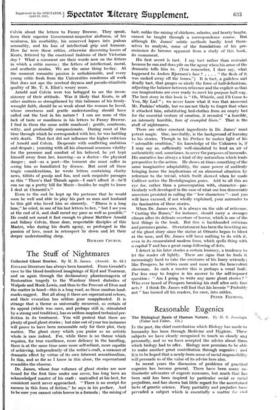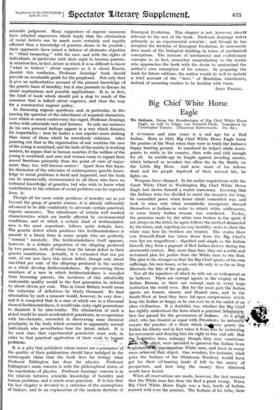Reasonable Eugenics
The Biological Basis of Human Nature. By H. S. Jennings. (Faber and Faber. 15s.) IN the past, the chief contribution which Biology has madeto humanity has been through Medicine and Hygiene. These subjects we have clearly recognized to touch us closely and personally, and so we have accepted the advice about them which biology had to offer. Biology now promises to be able to make another great contribution through eugenics ; and 'it is to be hoped that a newly-born sense of racial responsibility will persuade us of the value of its advice here also.
In recent years the discussion of problems of practical eugenics has become general. There have been many en- thusiastic advocates of eugenic measures, but much that has been said has been inspired by particular social or racial 'prejudices, and has shown but little regard for the ascertained facts of genetic sciehee. Fiery partiality and prejudice have pervaded a subject which is essentially a matter for cool
scientific judgment. Many supporters of eugenic measures have adopted arguments which imply that the elimination of racial defects can be much more certainly and rapidly effected than a knowledge of genetics shows to be possible their opponents have raised a defence of obstinate objection
" blind tampering " with the race, and with the rights of individuals, in particular with their right to become parents. A situation has, in fact, arisen in which it is as difficult to know what to believe " about eugenics as it is about Russia. Amidst this confusion, Professor Jennings' book should provide an invaluable guide for the perplexed. Not only does it give an authoritative account of the present knowledge of the genetic basis of heredity, but it also proceeds to discuss its social- implications and possible applications. It is, in fact, the kind of book which should put a stop to much of the nonsense that is talked about eugenics, and clear the way for a constructive eugenic policy.
In discussing eugenic questions, and, in particular, in dis- cussing the question of the inheritance of acquired characters, over which so much controversy has raged, Professor Jennings writes with admirable tact and fairness. In only one instance do his own personal feelings appear in a way which disturbs his impartiality ; here he makes a non sequitur more striking than many of those which he mercilessly criticizes. Aftei Pointing out that in the organization of ant societies the care of the young is socialized, and the bulk of the society is working neuters, he argues that in human societies if the welfare of the young is socialized, and men and women come to regard their sexual functions primarily from the point of view of enjoy- ment, they, too, will become neuter ! Apart from this lapse, his discussion of the relevance of contemporary genetic know ledge to social problems is lucid and impartial, and the book can be unreservedly recommended to all those who have no technical knowledge of genetics, but who wish to know what contribution to the solution of social problems can be expected from it.
Though all the more subtle problems of heredity are as yet beyond the grasp of genetic science, it is already sufficiently advanced to be able confidently to advocate certain practical, eugenic measures. The inheritance of certain well marked characteristics which are hardly affected by environmental conditions, and of which a certain kind of feebleminded- ness is the most important, follows quite definite laws. The genetic defect which produces this feeblemindedness is present in a latent form in many people who are perfectly " normal " mentally. The feeblemindedness itself appears, however, in a definite proportion of the offspring produced by two parents, both of whom bear the latent defect in their genetic constitution. Actually, it is estimated that ten per cent. of our race have this latent defect, though only about one-third per cent. of the offspring produced in the society as a whole develop feeblemindedness. By preventing those members of a race in which feeblemindedness is manifest from becoming parents, the incidence of this admittedly undesirable quality would in the first generation be reduced by about eleven per cent. This in Great Britain would mean the reduction of' defectives by thirty thousand. Its final elimination by such a measure would, however, be very slow ; and it is computed that in a race of which one in a thousand showed feeblemindedness, it would take sixty-eight generations to diminish it by- nine-tenths. The elimination of such a defect would be much acceleratedif geneticists, in co-operation with bio-chemists, succeeded in discovering some chemical peculiarity in the body which occurred in apparently normal individuals who nevertheless bore the latent defect. It is for such clues that experimental geneticists must seek, in order to find practical application of their work to human iirobleMs.
It is a pity that publiShers whose names are a guarantee-of the quality of their publications should have indulged in the extravagant claim that the book does for biology what Professor Eddington has done for physics. Professor Eddington's main concern is with the philosophical status of the conclusions of physics. Professor Jennings' concern is in the relation between scientific knowledge of heredity and human problems, and is much more practical. It is true that the last chapter is devoted to a criticism of the assumptions of biology. and to an explanation of the modern doctrine of
. . .
Emergent Evolution. This chapter is not, however, closely relevant to the rest of the book. Professor Jennings writes primarily as an experimental scientist ; and though he has accepted the doctrine of Emergent Evolution, he necessarily does much of his biological thinking in terms of mechanical conceptions. The mixture of mechanistic and evolutionary concepts is, in fact, somewhat unsatisfactory to the reader who approaches the book with the desire to understand the author's own conception of his science. In preparing the book for future editions, the author would do well to include a brief account of the " laws " of Mendelian inheritance, instead of assuming readers to be familiar with them.
JOHN PILLEY.















































 Previous page
Previous page